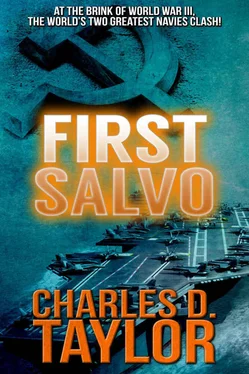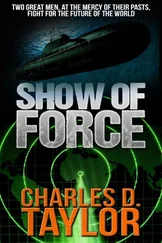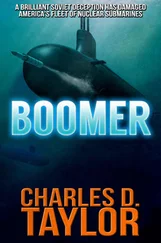“I’ll take my chances, Cobb. Keradin seems to have done just fine taking his.”
He remembered the Russian general standing stoically behind the wheelhouse, exposing himself to fire, welcoming death as a release from captivity. Cobb smiled at her. “He’s almost as tough as you. Okay. I guess at this point I can arrange anything.”
“Thank you.” Her face softened again. “I don’t know how to thank you…”
He patted her hand again and smiled back. “Later. My boat’s ready and I’ve got some volunteers who are willing to fill up my crew. I told them I was just waiting to say good-bye to you as soon as—”
“Never mind, Cobb,” she insisted. “I’ll manage.” She sat up, dangling her feet over the edge of the bed. Her head hung down for a minute. Then she looked up at him, smiling painfully. “You know, Cobb, it hurts a little.” She pointed first to her head and then to the arm tightly strapped to her ribs with a sling. She took a couple of deep breaths. “There. See? All gone — or almost.” She stood up. The ridiculous hospital gown the nurses had half wrapped around her fell open. “No secrets, eh, Cobb? I guess there’s no need — after our little episode in Keradin’s room.” She looked around. “My clothes?”
“I suppose they burned them. What was left of them was covered with blood. We’ll find something.”
“How about Keradin?” she asked, wincing slightly as she walked back and forth. “Did you give his back yet, or do you still have him running around in his shorts?” Her face brightened with a malicious grin.
“General Keradin is now dressed as a Turkish sailor.”
She turned, her eyes again slightly narrowed. “If you were me, Cobb, you would not offer him the slightest comfort.” Looking away, she said, “Forget it. He’s your prisoner, not mine. Please find me some clothes. I want only your promise.” She broke into tears.
Cobb went over to her, turning her around slowly. She looked up at him, tears running down her cheeks. Tentatively, she placed her free hand on his shoulder, blinking back her tears. Cobb pulled her to him, his arms encircling her, and said, “I’m sorry I ever thought about leaving you here, breaking my promise.”
“Shh,” she whispered in his ear. “Just hold me for a moment. I was afraid you might not take me after everything you saw at the dacha.”
He kissed her lightly. “Never entered my mind. Here, let me go find something for you.” There would be time to be together later; there was none now. He released her very slowly, gazing into those deep eyes. He was not accustomed to the emotion he felt. Perhaps he was just tired. Perhaps that was why he was experiencing this odd and very warm feeling.
Through Pentagon intelligence reports, the president was fully aware of the dawn meeting in the Kremlin of the STAVKA, the Main Military Council. He also knew that the purpose of the conference was to make final recommendations to the State Committee for Defense. But these recommendations were a foregone conclusion, for the meeting was simply to determine any final alterations to their operations plan. Since the Soviet leadership preferred efficiency and constancy, the president anticipated there would be no changes.
Of those seen entering the Kremlin that early morning, the Soviet Navy was noted to be heavily represented. The intelligence report reinforced Admiral Pratt’s earlier assessments for those in Washington who supported his views. Admiral Chemavin, the commander in chief of the Soviet Navy, was in attendance along with Admiral Milchaylovskiy, commander of the Northern Fleet, Admiral Khovrin, commander of the Black Sea Fleet, and General Colonel (Aviation) Mironenko, commander of Naval Aviation. General Keradin’s second in command, General Colonel Melekhin, surprised the president when it was learned he attended the meeting, because intelligence reports predicted weeks before that Melekhin’s status was weak and that he would likely be purged.
While the White House was not privy to the minutes of the STAVKA, much of the discussion in the meeting could be predicted. The Commander of the Northern Fleet couldn’t report how many of his submarines had broken through the American CAPTOR barrier. His submarines were under strict orders not to report to Murmansk until they commenced their attacks, since the first radio signal would give away their position. The weather over Spitzbergen had cleared enough so that the devastation of the attack on the Longyearbyen airport was known. But the White House knew that the STAVKA was at a loss concerning the whereabouts of the freighter carrying the balance of their decoys. Another flight of Bear bombers was approaching Longyearbyen even as the STAVKA was meeting, but those in the Kremlin still did not know that reinforcement was futile.
Admiral Khovrin would report that the majority of his Black Sea Fleet, including the carrier Minsk , had now passed through the Turkish straits and the Mediterranean Fifth Escadra was at full strength. He would also point out that harassment in the Aegean Sea by the Greek navy had indeed delayed plans somewhat, but he was confident Admiral Konstantin, now commanding the Fifth Escadra, was a superb on-scene commander. What that really meant was that he would follow orders from Moscow without question. The entire scope of the coming confrontation had already been specified, for that was the Soviet command system — centralization of command, all orders to front-line units on land and at sea issued from the Kremlin where the full strategic picture could be evaluated. There was no localized decision making of a strategic nature in the Soviet military. It was unheard of that a shot could be fired without direction from Moscow. Of course, in the heat of battle the responsibility fell on the shoulders of the on-scene commander, in this case, Admiral Konstantin. If Moscow’s strategy failed, it would be his fault.
The Pentagon also reassured the White House that the previous day’s face-off between Soviet aircraft and their American counterparts would make little impression on General Colonel (Aviation) Mironenko. He was absolutely convinced there was no possible way the U.S. Sixth Fleet could withstand his first salvo. The Americans would wait until it was too late (he had once written for Morskoi Sbornik,) and then his follow-up attack, combined with submarine- and surface-launched missiles, would destroy the survivors. The American chief of staff assured the president that it was preferable to have Mironenko believe this right up to the end.
There was confidence in the White House that the supply routes to Europe could remain open. Though final information remained sketchy due to the lack of a final report from the SEAL team sent into Spitzbergen, the Pentagon now projected that approximately 75 percent of the U.S. convoy ships would survive the passage. The president, more than any other man, maintained absolute confidence in Admiral Pratt. Pratt, through his own efforts, had learned more about his foe, spent more time in developing original strategy, and certainly deserved to command the main force. Perhaps a major reason for the president’s confidence was simply that there was no other man to do the job.
The final piece of the puzzle, one that could only be speculated on, was an unknown and purely theoretical factor — General Keradin of the Strategic Rocket Forces. A major Soviet effort had been made to locate and recover him in Istanbul. Word had come in hours before from Pratt that the undercover man, Cobb, had succeeded in escaping the Turkish port and was now en route to Saratoga with substantial air cover as protection. But that was no guarantee that the Russians wouldn’t once again learn where Keradin was and try to kill him. And, the president suggested, once we have him under our control, can we be sure that that will have the desired effect? Would the Soviet leaders’ dislike of General Colonel Melekhin as Keradin’s replacement, coupled with the instability created by a new face in the command system, allow the U.S. that extra bit of time to prevent a nuclear exchange? Much of the answer to this question also hinged on Admiral Pratt’s defense of his battle group and its ability to destroy Admiral Konstantin’s Fifth Escadra.
Читать дальше












